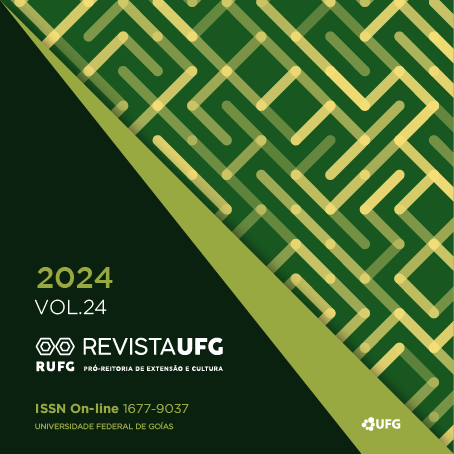EDUCATIONAL PRAXIS IN QUILOMBOLA TERRITORY
A case study of the Araçatiba School, Viana-ES
DOI:
https://doi.org/10.5216/revufg.v24.80333Keywords:
Educational practices, Ethnic-racial education, Pedagogical Political Project, Quilombola communityAbstract
The article analyzes the dialogical relationship between the Araçatiba Municipal Elementary School and the Quilombola community of Viana-ES, considering the regulatory frameworks for ethnic-racial education. Using the theoretical approach of decolonial studies and the philosophical assumptions of human formation in dialogue with education for ethnic-racial relations, the qualitative research employs a case study, document analysis (legislation, political-pedagogical project and teaching practices), participant observation techniques and questionnaires with school professionals. The results indicate that the school unit is effectively integrated with the community, valuing its historical and cultural heritage and highlighting the importance of pedagogical practices that reinforce identity and belonging. This study contributes to the effective implementation of educational approaches that promote anti-racist education.
Downloads
Downloads
Published
Versions
- 2025-03-24 (3)
- 2025-03-10 (2)
- 2024-12-18 (1)
How to Cite
Issue
Section
License
Copyright (c) 2024 Revista UFG

This work is licensed under a Creative Commons Attribution 4.0 International License.
Revista UFG uses the Creative Commons CC-BY (4.0) - Attribution 4.0 International license for open access journals (Open Archives Initiative - OAI) as a basis for transferring rights.
Authors who publish in this journal agree to the following terms:
1) Authors may distribute, remix, adapt and build upon their work, even for commercial purposes, as long as they give UFG proper credit for the original creation. Authors may copy and redistribute the material in any medium or format.
2) Authors are allowed and encouraged to publish and distribute their work online (e.g., in institutional repositories or on their personal page) at any point before or during the editorial process, provided that reference is made to the place of publication origin, that is, the electronic address/reference of Revista UFG.
3) The authors of works published in Revista UFG are expressly responsible for their content.
4) All works submitted to Revista UFG that have images, photographs, figures in their body must be accompanied by a term of assignment of copyright of the author, of the participating member of the image and, in the case of children, of the relatives of the exposed children , with their data and signature.
Access the IMAGE USE AUTHORIZATION TERM document here.










